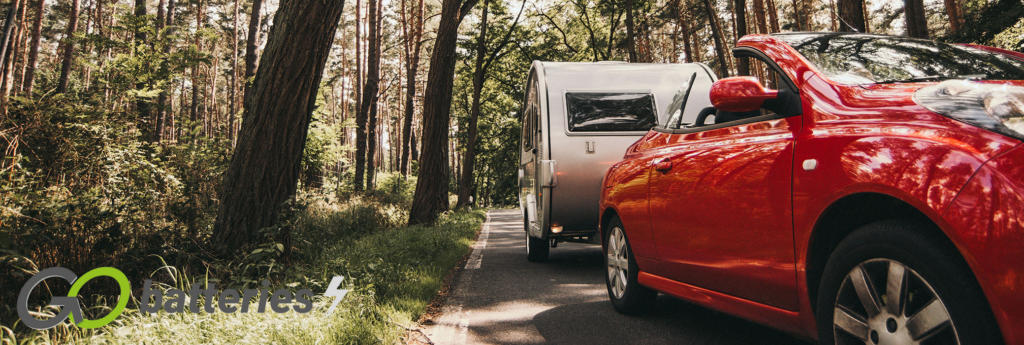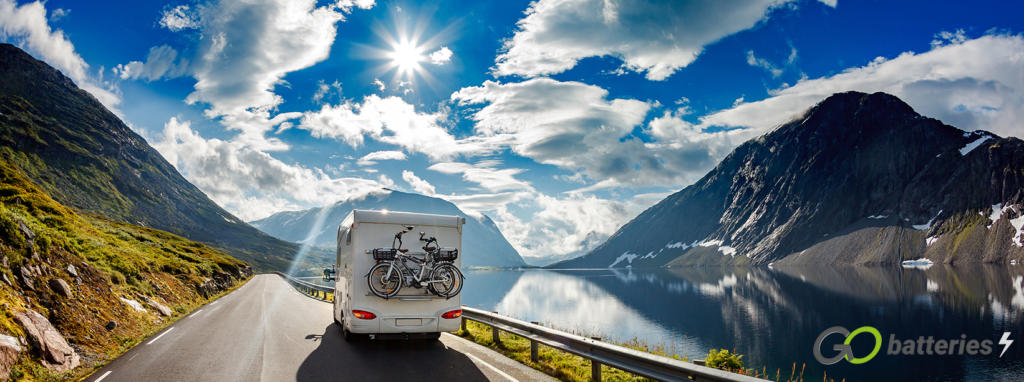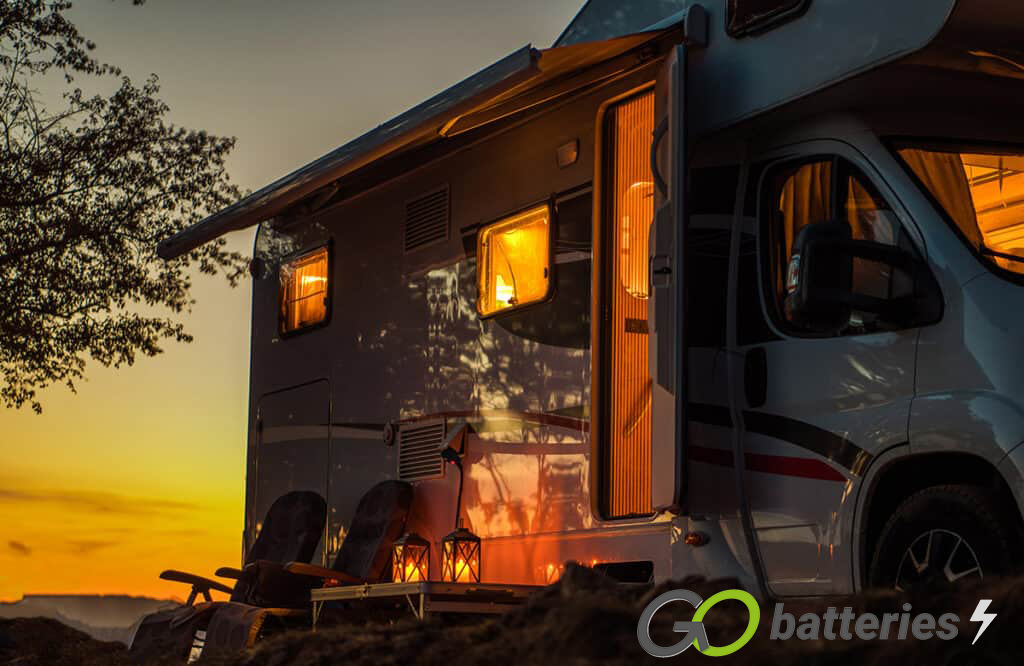
What is a Leisure Battery?
A leisure battery is designed to store power over a period of time and performs best under slow drain situations, as a power source for 12 volt appliances and equipment in many environments such as caravans, motorhomes, off grid and many more besides. Where as a car battery is primarily designed for engine starting, producing a high burst of power in order to start the vehicle.
Within the leisure and marine battery ranges you will come across ‘Dual Purpose’ batteries, these batteries have the ability to supply power over a period of time for your electrical appliances (as mentioned below), as well as having the ability to provide cranking power which can start an engine.
Leisure batteries supply a steady source of power over a prolonged period of time for: lights, fridge, kettle, television, to name a few. Leisure batteries offer the ability to make your caravan or camping experience and surroundings a more comfortable, habitable accommodation.
Most traditional leisure batteries are lead-acid batteries, we will explain the different technologies of lead-acid batteries below. A more modern technology, ‘Lithium’ LiFePO4 batteries are becoming more and more popular with anyone who requires a power source for motorhomes, caravans, boats, recreational vehicles, off grid and more.
Lithium leisure batteries are becoming so popular because they have almost none of the disadvantages of traditional lead-acid batteries, which we will cover in the Lithium section.

Leisure Battery Technologies
Most traditional leisure batteries are lead-acid batteries, we will explain the different technologies of lead-acid batteries here and help you decide which technology best suits your needs.
Wet Flooded Batteries
Lead-acid batteries which are cheaper than AGM, Gel or Lithium batteries, providing a reliable low maintenance power storage solution making them a popular choice for powering your onboard equipment. There are two main types of wet leisure battery, maintenance free, which is sealed so you can’t access the inside to check electrolyte (acid) levels. The other type is open, which means you can access the inside of the battery where you’ll check the electrolyte levels during your battery maintenance schedule.
As with all wet batteries, sealed or not, they need to be handle with care due to the acid content and kept in an upright position.

Rule of thumb: The more plates which a cell contains, and therefore form a larger surface, the larger the cold start power (CCA) which the battery can deliver for engine starting. However, if the space in the cell is used for fewer, but thicker plates, the cycle stability is increased. This means that the battery is designed for a higher charge throughput (continual charging and discharging process) as would be used in leisure batteries.
The cells are contained in a casing which is made from acid-resistant plastic (polypropylene). Early batteries had screw plugs which enabled them to be topped up with distilled water. Modern batteries are completely maintenance-free. Water does not need to be, and must not be topped up. Although AGM batteries still have “one-way plugs”, these must not be opened under any circumstances.
AGM Batteries
AGM, or Absorbent Glass Mat batteries feature a fibreglass matting which surrounds the lead plates with the electrolyte absorbed within it. AGM batteries are spill proof (and so can be theoretically mounted in any position) and have far better vibration resistance than a standard lead-acid battery.
The major benefits with AGM batteries are their ability to withstand a greater number of charging cycles and are better able to deep cycle, making them more reliable and capable of a much longer lifespan (for various technical reasons) than their wet counterparts.

Lithium Batteries
As mentioned previously, Lithium batteries are becoming far more popular and our extensive Relion range of Lithium batteries can cover all of your Lithium requirements. One of the reasons why Lithium batteries are so popular is that they have virtually none of the disadvantages of your traditional lead-acid batteries.
Here are some of the reasons why people are making the switch to Lithium batteries:
Fast Charging.
Relion Lithium Iron Phosphate batteries can be charged in as fast as 1 hour. We recommend using a rate that charges the batteries in 2-5 hours. Please refer to the data sheet for your particular model, to find the recommended charge rates. All of our data sheets are available on our website within the product section.
More Usable Capacity.
Relion LiFePO4 Lithium Iron Phosphate batteries can be discharged up to 100% without risk of damage. Make sure you charge your battery immediately after discharge. We recommend discharging to be limited to 80-90% depth of discharge (DOD) to avoid the BMS disconnecting the battery.
Low Weight, Heavy on Power.
Relion Lithium batteries are approximately 50% lighter and provide up to 50% more energy than traditional flooded, AGM, or Gel lead acid batteries, and they provide more power.
3,500 - 6,000 expected life cycles, depending on depth of discharge.
Battery life is measured in life cycles and Relion’s LiFePO4 is typically rated to deliver 3500 cycles at 100% depth of discharge (DOD). If the depth of discharge is kept to 80% then the life cycles can increase to 6,000 cycles. Actual life expectancy is dependent on several variables based on your specific application. If used for the same application, a LiFePO4 battery can last up to 10X longer than a lead-acid battery.
Low Self Discharge Rate
Relion Lithium batteries are highly efficient, offer super-low resistance (and 99% efficiency), allowing much faster charging, with minimal losses.
Lead-Acid batteries lose power more quickly during discharge, having a self-discharge rate of 5 times or more than that of a Lithium battery.
When Lead-acid batteries are stored, we recommend you check the level of charge approximately once a month and charge as required.
When Lithium batteries are stored, you can happily leave them from 3 -12 months, in a dry environment between -5 to 35 Degrees C, ideally at 50% state of charge.
Completely Safe, No fumes or Corrosive liquids.
LiFePO4 batteries are non-toxic, non-contaminating and contain no rare earth metals, making them an environmentally conscious choice.
Relion's Phosphate-based batteries offer superior chemical and mechanical structure that does not overheat to unsafe levels. Thus, providing an increase in safety over Lithium-ion batteries made with other cathode materials. This is because the charged and uncharged states of LiFePO4 are physically similar and highly robust, which lets the ions remain stable during the oxygen flux that happens alongside charge cycles or possible malfunctions. Overall, the iron phosphate-oxide bond is stronger than the cobalt-oxide bond, so when the battery is overcharged or subject to physical damage then the phosphate-oxide bond remains structurally stable; whereas in other Lithium chemistries the bonds begin breaking down and releasing excessive heat.
Lithium phosphate cells are incombustible, which is an important feature in the event of mishandling during charging or discharging. They can also withstand harsh conditions, be it freezing cold, scorching heat or rough terrain. When subjected to hazardous events, such as collision or short-circuiting, they won’t explode or catch fire, significantly reducing any chance of harm. If you’re selecting a Lithium battery and anticipate use in hazardous or unstable environments, LiFePO4 is likely your best choice.
Maintenance Free, Plug, Play and charged. No watering.
Unlike Lead-acid batteries which require more maintenance and have fewer operation opportunities, Relion Lithium batteries are maintenance free.
Can be mounted in any position
Relion Lithium batteries can be mounted in any position because there is no fluid inside LiFePO4 batteries. This gives you the flexibility to install the battery where it is best suited for your application.

Lithium Benefits For Recreational Vehicles
It’s hard to beat a Relion Lithium Iron Phosphate (LiFePO4) battery when they deliver everything you need to support life on the road and off-the-grid. Inherently safe and lightweight, you’ll not only travel further more efficiently you’ll do it with less of a footprint without sacrificing power, performance and reliability.
Which Relion Lithium Battery is Right For Your RV
When your journey involves countless miles or remote campsites, you need a trustworthy battery that won’t hold you back. Lightweight Relion Lithium Iron Phosphate (LiFePO4) batteries are maintenance-free, fast-charging and environmentally-friendly to provide reliable power and peace of mind while you enjoy some well-earned peace and quiet.
With so many different configurations, applications and needs, RV owners know finding a battery that checks all the boxes can be a challenge. The chart below shows common batteries purchased for use in different classes of RVs.
Helpful RV Chart
Factors Affecting Battery Performance
The temperature can affect the performance of your leisure battery in a rather adverse way, The capacity figure of the battery is expressed in Amp Hours (Ah) but this number is only applicable when the ambient temperature is 25C. In reality, there are many occasions when the temperature falls below 25C and for roughly every one degree drop in temperature, there’s an approximate one percent reduction in Ah capacity.
As an example: If a battery is rated at 80Ah and is operating in temperatures of 15C, then this would be a ten degree reduction in ambient temperature, giving a 10 percent reduction in the battery capacity. The normal 80Ah battery would now effectively perform at 72Ah, and were the temperature to drop further so would the batteries capacity. This can be an issue faced by caravan and motorhome users who maybe enjoying winter sports or trips, and when faced with a reduced capacity battery at a time when heating and more lighting maybe required than it would be in warmer conditions, what can be done.
If you have a battery box mounted inside, then heat within the caravan or motorhome would help to keep the temperature up and thus improve the battery performance. However, some batteries are mounted externally where the temperatures will be much lower. As a battery ages, its performance deteriorates and requires recharging more frequently, the cycle life will constantly reduce until it is no longer serviceable.
Increased rates of consumption: If numerous appliances are being used at the same time a batteries increased discharge rate will affect its ability to provide power. The battery will discharge far more quickly as extra demand is placed on it, so making sure the correct size and power of battery for your needs is crucial.
What size leisure battery do I need? You will need to work out what your consumption will be on your 12 volt equipment, and for how long you intend on running the equipment. An example is shown below:

















